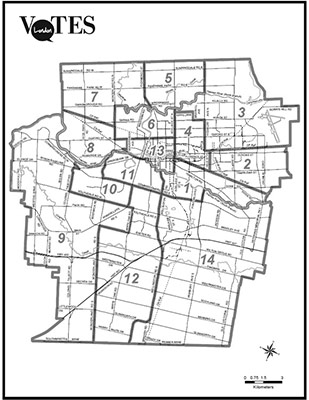Choosing city councillor
 CREDIT: LONDON.CA
CREDIT: LONDON.CAIf your strategy for choosing whom to vote for consists of tallying up who has the most lawn signs on your street, it might be time to re-evaluate your strategy. There’s never been a better time to vote, because the voter turnout rates in London are at their lowest ever. Since only 39.9 per cent of eligible voters cast a ballot in the 2010 election, every vote cast counted more than twice as much. Former Mayor Joe Fontana was only elected by a margin of 2,500 votes, less than one percent of the city’s population.
In order to properly select a candidate, you have to know what kind of decisions your councillor and mayor will be responsible for making. The municipality is the third level of government falling under both the provincial and federal government’s oversight in matters, such as health, education, criminal law and national defence. Rather than rendering the municipal government useless, cities are responsible for an enormous number of public services, including water treatment and emergency services.
One important role of a city council is to determine how the city’s finances are allocated in the annual budget. This term, Fontana managed to freeze property taxes for two of the four budgets passed during his time in office.
Freezing anything in the short term, whether it’s tax increases or public worker’s salaries, is political propaganda and nothing more. In the real world, expenses don’t freeze. The cost of materials for city infrastructure doesn’t go down and water purification isn’t getting cheaper. Any politician promising better city services for the same amount of money should be regarded with a healthy level of scepticism.
There are some fairly predictable elements that will be present in future city council meetings. For example, the police board will predict dire outcomes if they don’t receive their requested budget increase; there will be conflict over the affordable housing fund; and the pittance allocated to fund bike lanes will be appropriately bemoaned.
The interesting part is going to be seeing the decisions council makes regarding some of the larger projects looming ahead. Current city council was supporting an enormous shopping district South on Wellington despite a significant backlash from environmental groups. Whether the idea continues to hold favour after the election has yet to be seen.
The role of an elected official is to make decisions based on the interests of their constituents and the information provided to them. It’s worth mentioning that city staff plays a large role in providing that information. Many individuals within the city’s bureaucracy hold enormously influential roles despite not being elected officials. Their research is only half of the equation, though. The other half has to come from the constituents demanding their councillors uphold the interests of the individuals in their ward.
Editorial opinions or comments expressed in this online edition of Interrobang newspaper reflect the views of the writer and are not those of the Interrobang or the Fanshawe Student Union. The Interrobang is published weekly by the Fanshawe Student Union at 1001 Fanshawe College Blvd., P.O. Box 7005, London, Ontario, N5Y 5R6 and distributed through the Fanshawe College community. Letters to the editor are welcome. All letters are subject to editing and should be emailed. All letters must be accompanied by contact information. Letters can also be submitted online by clicking here.













